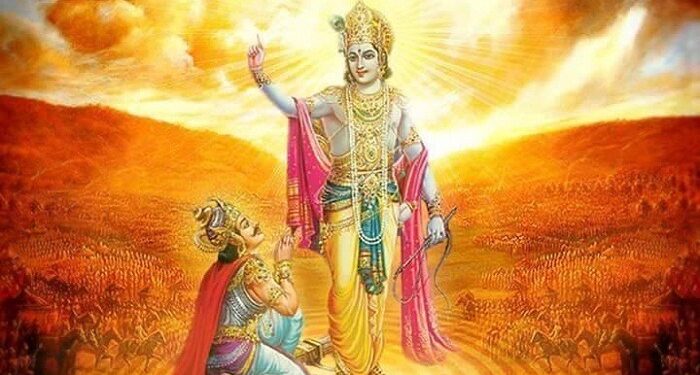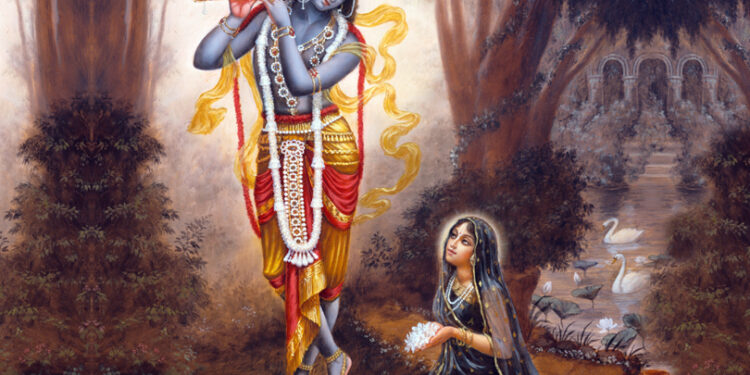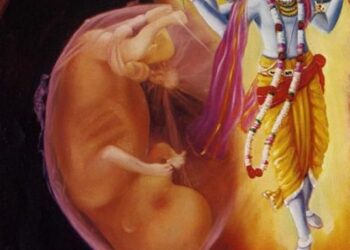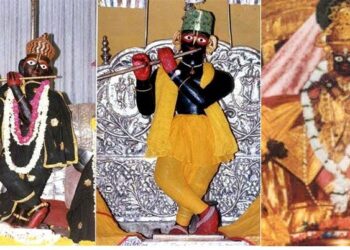TEXT 25
avyakto ‘yam acintyo ‘yam
avikāryo ‘yam ucyate
tasmād evaṁ viditvainaṁ
nānuśocitum arhasi
SYNONYMS
avyaktaḥ—invisible; ayam—this soul; acintyaḥ—inconceivable; ayam—this soul; avikāryaḥ—unchangeable; ayam—this soul; ucyate—is said; tasmāt—therefore; evam—like this; viditvā—knowing it well; enam—this soul; na—do not; anuśocitum—to lament; arhasi—you deserve.
TRANSLATION
It is said that the soul is invisible, inconceivable and immutable. Knowing this, you should not grieve for the body.
PURPORT
As described previously, the magnitude of the soul is so small for our material calculation that he cannot be seen even by the most powerful microscope; therefore, he is invisible. As far as the soul’s existence is concerned, no one can establish his existence experimentally beyond the proof of śruti, or Vedic wisdom. We have to accept this truth, because there is no other source of understanding the existence of the soul, although it is a fact by perception. There are many things we have to accept solely on grounds of superior authority. No one can deny the existence of his father, based upon the authority of his mother. There is no source of understanding the identity of the father except by the authority of the mother. Similarly, there is no source of understanding the soul except by studying the Vedas. In other words, the soul is inconceivable by human experimental knowledge. The soul is consciousness and conscious—that also is the statement of the Vedas, and we have to accept that. Unlike the bodily changes, there is no change in the soul. As eternally unchangeable, the soul remains atomic in comparison to the infinite Supreme Soul. The Supreme Soul is infinite, and the atomic soul is infinitesimal. Therefore, the infinitesimal soul, being unchangeable, can never become equal to the infinite soul, or the Supreme Personality of Godhead. This concept is repeated in the Vedas in different ways just to confirm the stability of the conception of the soul. Repetition of something is necessary in order that we understand the matter thoroughly, without error.
TEXT 26
atha cainaṁ nitya-jātaṁ
nityaṁ vā manyase mṛtam
tathāpi tvaṁ mahā-bāho
nainaṁ śocitum arhasi
SYNONYMS
atha—if, however; ca—also; enam—this soul; nitya-jātam—always born; nityam—forever; vā—either; manyase—you so think; mṛtam—dead; tathā api—still; tvam—you; mahā—bāho—O mighty—armed one; na—never; enam—about the soul; śocitum—to lament; arhasi—deserve.
TRANSLATION
If, however, you think that the soul [or the symptoms of life] is always born and dies forever, you still have no reason to lament, O mighty-armed.
PURPORT
There is always a class of philosophers, almost akin to the Buddhists, who do not believe in the separate existence of the soul beyond the body. When Lord Kṛṣṇa spoke the Bhagavad-gītā, it appears that such philosophers existed, and they were known as the lokāyatikas and vaibhāṣikas. Such philosophers maintain that life symptoms take place at a certain mature condition of material combination. The modern material scientist and materialist philosophers also think similarly. According to them, the body is a combination of physical elements, and at a certain stage the life symptoms develop by interaction of the physical and chemical elements. The science of anthropology is based on this philosophy. Currently, many pseudo religions—now becoming fashionable in America—are also adhering to this philosophy, as are the nihilistic nondevotional Buddhist sects.
Even if Arjuna did not believe in the existence of the soul—as in the vaibhāṣika philosophy—there would still have been no cause for lamentation. No one laments the loss of a certain bulk of chemicals and stops discharging his prescribed duty. On the other hand, in modern science and scientific warfare, so many tons of chemicals are wasted for achieving victory over the enemy. According to the vaibhāṣika philosophy, the so-called soul or ātmā vanishes along with the deterioration of the body. So, in any case, whether Arjuna accepted the Vedic conclusion that there is an atomic soul or he did not believe in the existence of the soul, he had no reason to lament. According to this theory, since there are so many living entities generating out of matter every moment, and so many of them are being vanquished every moment, there is no need to grieve for such incidents. If there were no rebirth for the soul, Arjuna had no reason to be afraid of being affected by sinful reactions due to his killing his grandfather and teacher. But at the same time, Kṛṣṇa sarcastically addressed Arjuna as mahā-bāhu, mighty-armed, because He, at least, did not accept the theory of the vaibhāṣikas, which leaves aside the Vedic wisdom. As a kṣatriya, Arjuna belonged to the Vedic culture, and it behooved him to continue to follow its principles.


















